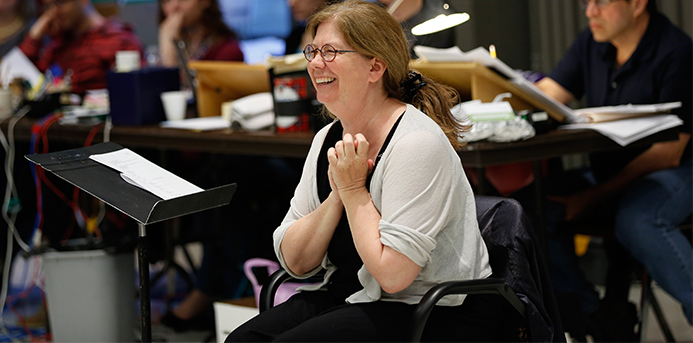“Treasure Island” is one of those stories that has seeped into our culture. The way we picture pirates – those eye patches, peg legs, parrots and treasure maps – can be traced back to Robert Louis Stevenson’s 1888 novel. The book has been turned into dozens of plays, movies and cartoons, and now it’s getting the Mary Zimmerman treatment at Lookingglass Theatre.
Zimmerman, who lives in Evanston and teaches at Northwestern University, is one of the area’s most acclaimed and popular directors. When we called her in August at her vacation home in Maine, she hadn’t begun writing the script for “Treasure Island.” She wasn’t behind schedule, however – this is just how she works, as she explained. This is an edited transcript of our conversation.
Make It Better: Explain your method for creating new plays during rehearsals.
Mary Zimmerman: I start with the actors, with no script – which isn’t as crazy as it sounds, because there’s the text that we’re basing our show on. I have to design it in advance, but we try to leave the design open to possibilities. Then I’m bringing in texts every day. I’m a day ahead of the actors. I’m working on it and being inspired by them. The script is usually complete a few days before we go into technical rehearsals.
Why do you work this way?
It grew organically out of doing performance art pieces in school. The one time in my life when I was asked to do a script in advance, it closed off a certain kind of inventiveness. I believe a lot in the unconscious and in the intensity that this process creates. It kind of pushes me up against a wall, and I can’t be very calculating. I have to play in a way like a child plays. It’s very spontaneous, and it also gets me out of people’s opinions. Nowadays, any script you see has gone through so many workshops, so many opinions, so much input. I feel constrained by that kind of thing. I like having this primary and primal relationship to the text – which is deep and personal and happening very fast. Psychologically, it’s easier for me. I’m not as frightened going in … But physically, it’s getting harder and harder. I tend to wake in the small hours and write that day’s script. The kind of intensity of energy that takes, it’s really exhausting. The pressure, the responsibility, the demand is so great – although when I’m in it, I don’t feel that way. Figuring stuff out on the fly with people is just a great joy to me.
Why did you decide to adapt “Treasure Island”?
I was here (in Maine) last summer and I thought to myself, “Have I actually read ‘Treasure Island’?” It’s so much part of the culture that you feel like you know it. There was this really handsome old copy of it in the library up here, and I read it. As I read, I saw it onstage. I found it gorgeously written – and really frightening and page-turning. My goal with the production is to make it feel as scary as the experience of reading the book does. There’s something about it that calls to anyone reading it … toward more adventure, toward more life. This ordinary boy, Jim, is swept up in this incredible adventure in which he proves himself quite brave, although very modest and unassuming. We attach to him so strongly.
How bad are the bad guys in “Treasure Island”?
Long John Silver switches back and forth. He’s very charming and charismatic. The pirates are also really funny. You can’t help but be attracted to them in a way. There’s a scene where Billy Bones is begging Jim for a drink. Something in that scene is so contemporary. The way the alcoholic talks is so exactly correct. There are many, many passages that are like that. They are extremely vivid and extremely true to me.
“Treasure Island” begins Oct. 7 at Lookingglass Theatre, 821 N. Michigan Ave., Chicago. For tickets, call 312-337-0665 or visit lookingglasstheatre.org.

